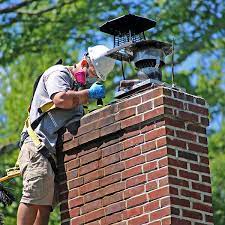Welcome to Emberstone Asheville’s guide to chimney inspections in Asheville! Whether you’re a seasoned homeowner or a new resident to the area, understanding the importance of chimney inspections is crucial for maintaining the safety and integrity of your home. In this comprehensive guide, we’ll explore everything you need to know about chimney inspections in Asheville, including why they’re essential, when to schedule them, and what to expect during the inspection process.

Why Chimney Inspections Matter
Chimneys play a vital role in your home’s ventilation system, allowing smoke and other combustion byproducts to safely exit your living space. However, over time, chimneys can develop a buildup of creosote, a highly flammable substance produced by burning wood. Additionally, structural issues such as cracks or deterioration can compromise the chimney’s ability to function safely.
Regular chimney inspections are essential for identifying and addressing these issues before they escalate into more significant problems. Not only do inspections help prevent chimney fires, but they also ensure that your home’s heating system operates efficiently, saving you money on energy bills in the long run.
When to Schedule a Chimney Inspection
The frequency of chimney inspections depends on several factors, including the type of fuel you use, the frequency of use, and the age of your chimney. As a general rule of thumb, the National Fire Protection Association (NFPA) recommends annual chimney inspections for all heating systems.
If you use your fireplace or wood stove frequently, it’s especially important to schedule regular inspections to monitor for creosote buildup and other issues. Additionally, if you notice any signs of chimney damage, such as crumbling mortar or loose bricks, it’s crucial to have your chimney inspected as soon as possible to prevent further deterioration.
What to Expect During a Chimney Inspection
During a chimney inspection, a certified chimney sweep will thoroughly assess the condition of your chimney, both inside and out. There are three levels of chimney inspections, each corresponding to the extent of the evaluation:
- Level 1 Inspection: This basic inspection is recommended for chimneys that are regularly used and in good condition. The chimney sweep will visually examine accessible components of the chimney, including the flue, chimney cap, and exterior structure.
- Level 2 Inspection: A Level 2 inspection is more comprehensive and is typically recommended when buying or selling a home, after a chimney fire, or if there have been significant changes to the heating system. In addition to the components checked during a Level 1 inspection, a Level 2 inspection may also include video scanning of the chimney interior to detect hidden damage or buildup.
- Level 3 Inspection: This level of inspection is the most thorough and is reserved for situations where serious chimney issues are suspected. Level 3 inspections may involve removing components of the chimney or building structure to access hidden areas for inspection.
After completing the inspection, the chimney sweep will provide you with a detailed report outlining any issues found and recommendations for repairs or maintenance. Depending on the severity of the issues, repairs may range from simple chimney cleaning to more extensive repairs such as chimney relining or masonry work.
Conclusion
Regular chimney inspections are a crucial aspect of home maintenance, particularly in a picturesque area like Asheville where fireplaces are a common feature in many homes. By scheduling annual chimney inspections and addressing any issues promptly, you can ensure the safety and longevity of your home’s heating system.
At Emberstone Asheville, we understand the importance of chimney inspections in keeping your home safe and comfortable. Our team of certified chimney sweeps is dedicated to providing thorough inspections and high-quality chimney services to homeowners throughout the Asheville area. Contact us today to schedule your chimney inspection and take the first step towards a safer, more efficient home heating system.
